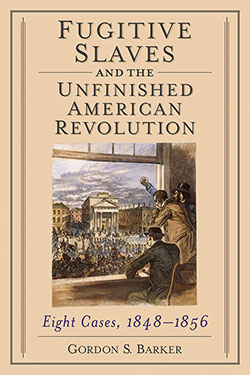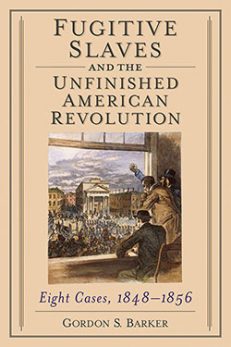Fugitive Slaves and the Unfinished American Revolution
Eight Cases, 1848–1856
$29.95
In stock
About the Book
This book posits that the American Revolution—waged to form a “more perfect union”—still raged long after the guns went silent. Eight major fugitive slave stories of the antebellum era are described and interpreted to demonstrate how fugitive slaves and their abolitionist allies embraced Patrick Henry’s motto “Give me Liberty or Give me Death” and the principles enshrined in the Declaration of Independence. African Americans and white abolitionists seized upon these dramatic events to exhort citizens to complete the Revolution by extending liberty to all Americans. Casting fugitive slaves and their slave revolt leaders as heroic American Revolutionaries seeking freedom for themselves and their enslaved brethren, this book provides a broader interpretation of the American Revolution.
About the Author(s)
Bibliographic Details
Gordon S. Barker
Format: softcover (6 x 9)
Pages: 232
Bibliographic Info: 28 photos, notes, bibliography, index
Copyright Date: 2013
pISBN: 978-0-7864-6987-1
eISBN: 978-1-4766-0277-6
Imprint: McFarland
Table of Contents
Table of Contents
Preface 1
Introduction: Fugitive Slaves and American Revolution 2
1. William and Ellen Craft: “Running a Thousand Miles” for Inalienable Rights 21
2. Rescuing Shadrach: The “Noblest Deed in Boston Since the Boston Tea-Party of 1773” 37
3. Thomas Sims: Renewing the Revolutionary Struggle for American Liberties 54
4. William Parker and Revolutionary Heroes at Christiana 77
5. The Jerry Rescue: Breaking Bondage and Saving America in Syracuse 96
6. Rescuing Joshua Glover and Guarding American Liberties 118
7. Anthony Burns: “Resolution to Strike the Blow, for Freedom or the Grave” 136
8. Margaret Garner: Tragedy and Revolutionary Resistance in Cincinnati 160
Epilogue: An Enduring Revolution 181
Chapter Notes 185
Bibliography 207
Index 213
Book Reviews & Awards
“an excellent explanation of slavery’s legal underpinnings”—Civil War News; “a thought-provoking and innovative portrayal of black political action in the antebellum period”—The Journal of Southern History; “a welcome addition to the literature on slave resistance…quite impressive…excellent work”—The Journal of African American History; “each of these carefully assembled chapters is well-written and accessible…. The book is a forceful indication that academic scholarship in general should pay more attention to the Underground Railroad to explain the linkages between the American revolution and the Civil War”—American Historical Review; “welcome contribution…highly readable, in-depth chronicling of individual narratives…will provide students with a more sophisticated understanding of the American Revolution”—H-Net Reviews; “In Fugitive Slaves and the Unfinished American Revolution, Gordon S. Barker combines impeccable scholarship with a keen storyteller’s eye. His fascinating account of eight cases contains stories of courage and resolve, as black Americans and their abolitionist allies sought to complete the unfulfilled promise of the Revolutionary era. Engrossing and superbly written.”—Douglas R. Egerton, author of Year of Meteors: Stephen Douglas, Abraham Lincoln, and the Election That Brought on the Civil War; “Barker’s comprehensive analysis of eight Africans of the Americas does much to reinsert the presence and more so, the agency of Black people into the histories of both Canada and the United States…the eight diverse African Americans he includes in his analysis provide a broad range of Black activism and examples of individual heroism as opposed to a more common collective experience and helps to provide a more inclusive master narrative.”—Rosemary Sadlier, President, Ontario Black History Society; “No one acted on the promises of the American Revolution with greater commitment and courage than the little-known African Americans at the heart of Gordon S. Barker’s stirring new book. Caught up in the dramatic fight over the Fugitive Slave Law of 1850, these brave souls, along with their abolitionist allies, demanded ‘liberty or death’ and thereby summoned Americans to renew the ‘spirit of 1776.’ They were, in Barker’s apt phrase, the ‘minutemen’ of their own day, on the front lines of freedom for a nation that has not yet paid them their due. Barker’s insightful and inspiring account rightly recognizes these unsung heroes of American democracy.”— Robert A. Gross, author of The Minutemen and Their World.





